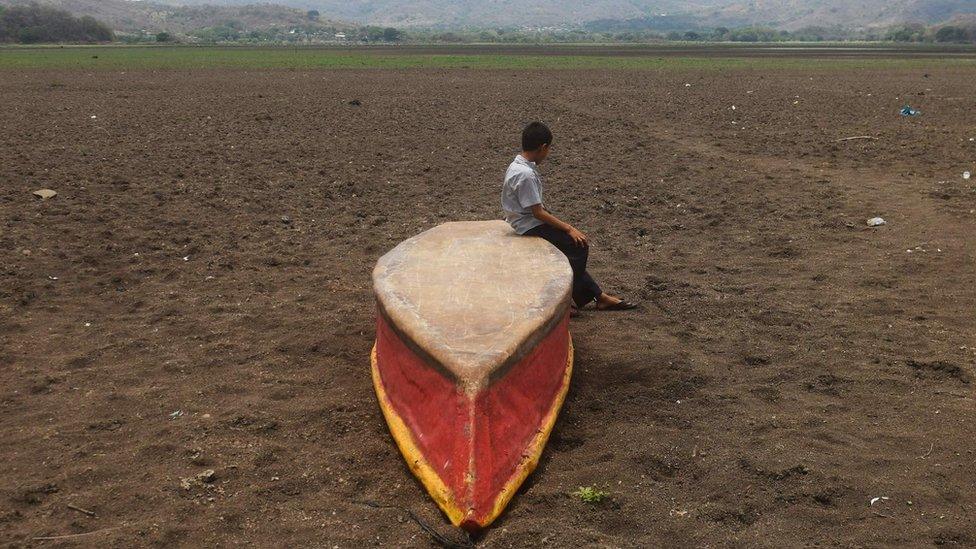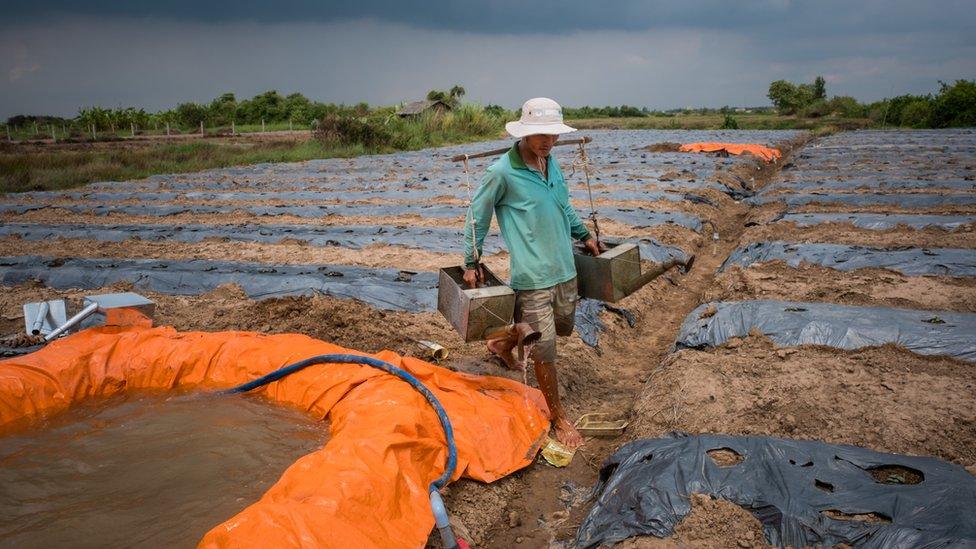Paris climate deal is 'lifeline' for world's poorest countries
- Published
- comments

A drought in Guatemala that has drained this lake is being linked to climate change in the region
The world's poorest nations say the Paris climate agreement is their "lifeline" and must be strengthened.
The Climate Vulnerable Forum, (CVF) representing 48 countries, said the deal was crucial to their survival.
In a swipe at President Trump's oft-used phrase, they said that "no country would be great again" without swift action.
Thousands of delegates are meeting here in Bonn to develop the rule book for the Paris deal.
Around one billion people live in countries that are part of the CVF.
The group firmly supports the idea, enshrined in the Paris agreement, that countries would do all in their power to keep temperatures from increasing more than 1.5C above pre-industrial levels.
"Keeping to 1.5 degrees is quite simply a matter of survival," said Debasu Bayleyegn Eyasu from Ethiopia, which holds the presidency of the CVF.
"For all of us, the Paris agreement is our lifeline."
Other speakers highlighted the fact that there is widespread dissatisfaction with the current US position on climate change.
President Trump is expected to decide on future US participation in the Paris accord after the G7 summit in Italy next week.
Picking up on Mr Trump's "make America great again," election battle-cry, Emmanuel Guzman from the Philippines said: "Without increased climate action, no country will be great again."
"The measure of greatness is how you are able to increase and enhance your climate action."
Mr Guzman said he was calling on all world leaders to increase their ambition and not just Mr Trump.
"I would not like to point a finger at someone, but it is a call for action by all big or small.
"If we don't achieve the goals of the Paris agreement there are irreversible damages and consequences."

Rising sea levels are causing problems for farmers in many climate vulnerable nations including Vietnam
"It's a grim scenario - that's really unacceptable to us."
The group highlighted some of the important differences between keeping temperature rises under 2 degrees or under 1.5.
The Greenland ice sheet would enter irreversible long-term decline, with significant impacts on sea levels at 1.6 degrees one delegate said.
Warming beyond 1.5 would also "appreciably increase the prevalence of extreme storms that have already been capable of large-scale loss of life and cutting a year's GDP in half for some of our members."
At the last major conference of negotiators in Marrakech last November, members of the CVF committed themselves to moving towards 100% renewable energy as soon as possible.
"Costa Rica produces 100% renewable energy most of the year," said William Calvo, the country's adjunct chief negotiator.
"But we won't stop there: we are tackling now the transport sector and hope to even export renewable power more widely in the region."
The idea that other countries are capable of picking up the slack if the Americans pull out of Paris gained support this week with the release of an analysis showing that India and China are likely to overshoot existing targets to cut carbon.
President Trump's actions to revitalise the coal industry in the US and to de-regulate oil and gas are unlikely to rapidly increase emissions before 2030 says the study from the Climate Action Tracker, external.
Between 2013 and 2016 Chin's coal use declined each year and a continued slow decline is expected. India says that planned coal-fired power plants may not be needed if recently announced green policies are effective.
"You have to have the U.S. on board ultimately to meet the goals set by the Paris Agreement," Bill Hare from Climate Analytics told news agencies.
"But if there's a hiatus for four years it doesn't mean it's the end of the game."
Follow Matt on Twitter, external and on Facebook, external.